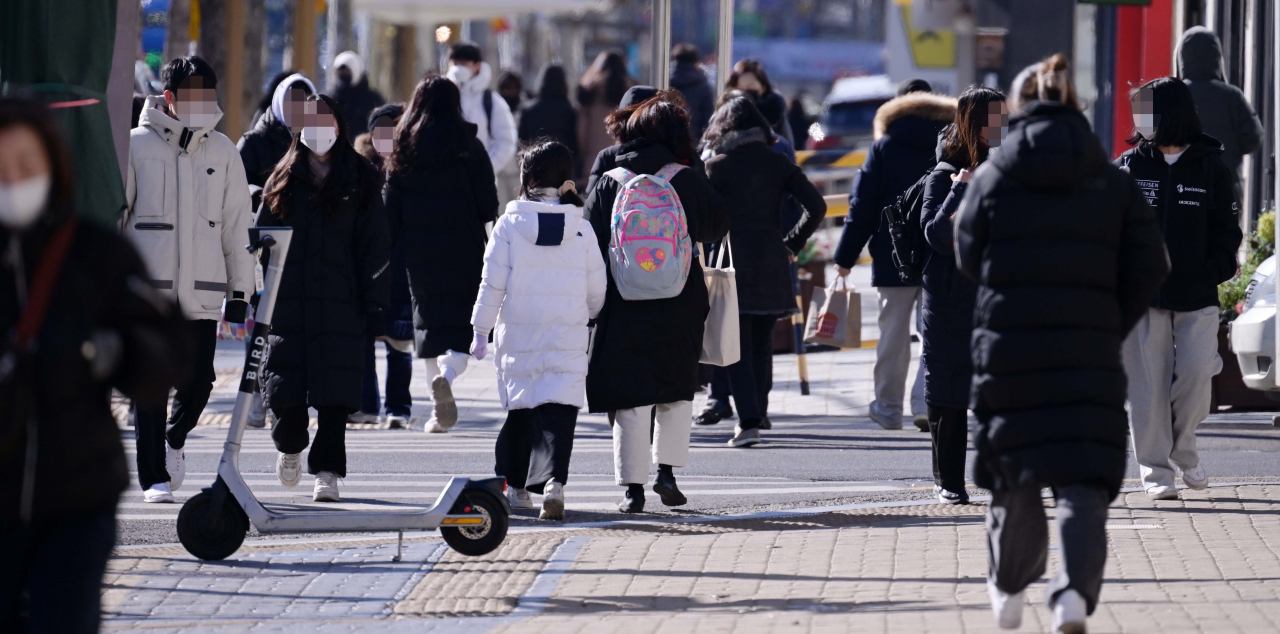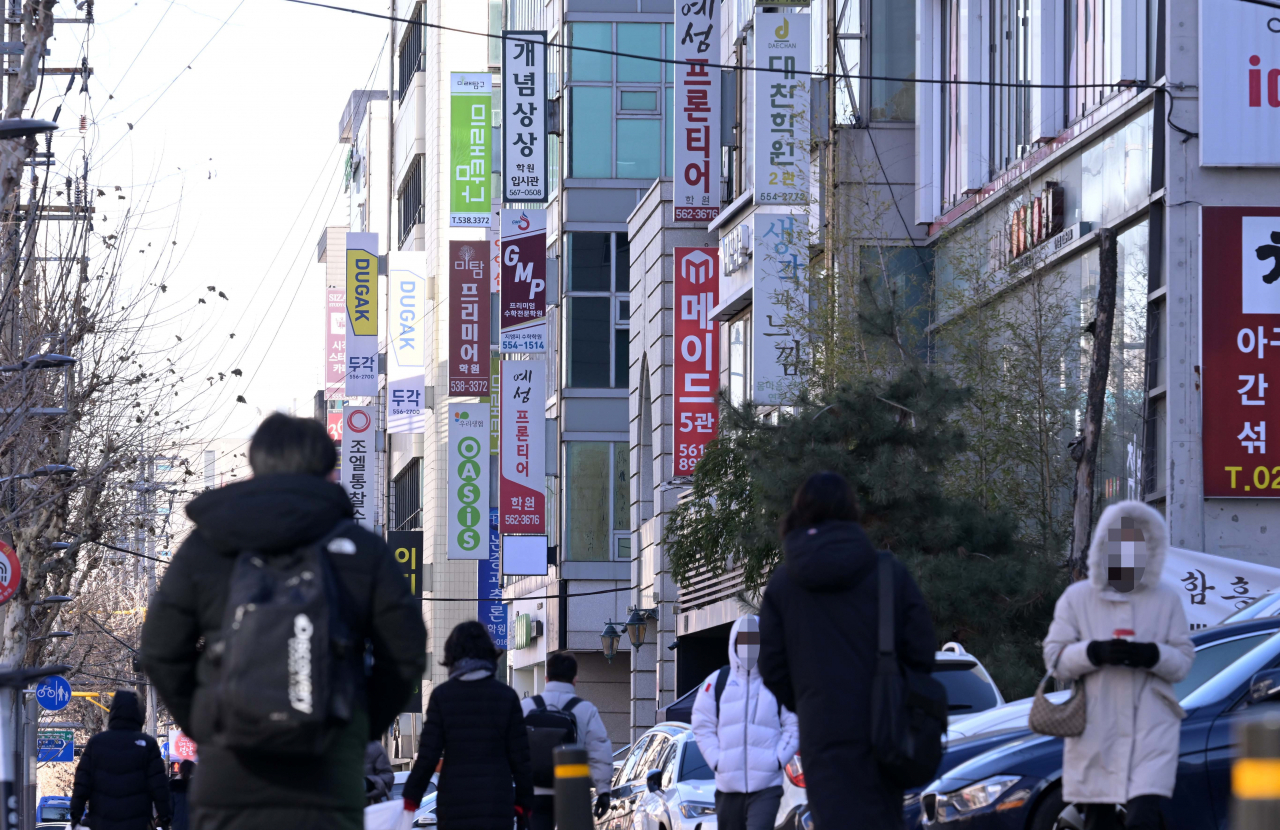[Weekender] Tale of Daechi moms: Women who go all in for kids’ college dreams
In Gangnam’s education-mad neighborhood, a child’s academic score defines mother’s success
Published : 2023-01-28 16:01:19

After over two decades of climbing the corporate ladder, Park, a 48-year-old who wished to be identified by her surname, resigned from an executive role two years ago to be a stay-at-home mom.
The reason was simple: to micromanage her then-middle school and 10th-grade daughters through Daechi-dong’s cutthroat educational landscape.
“It’s where ‘Sky Castle’ takes place. Moms give up time and money to send kids to prominent universities starting from elementary school,” Park said, referring to the TV drama that centers on Korea’s overheated education system and the importance of parenting.
“Some families even move to Daechi-dong only for educational purposes -- that’s how obsessed moms are.”
Daechi-dong, a neighborhood in Seoul's posh Gangnam district, has been considered the epicenter of South Korean parents’ passion their children's education. It is home to thousands of private academies, or hagwon, that provide tailor-made lessons and boast the nation’s best teachers in each specialty. Here, moms share the same goal regardless of socioeconomic status: wrap up 12 years of schooling with entrance to a prestigious university.
Park confides that she quit her job out of “working mom guilt” for not being able to pay enough attention to her daughters’ education. For years, she used to think she would never be one of the "Daechi moms" who ditch their careers for their kids, as her corporate life mattered too. As her daughters grew up and started to face the reality of admission competition, however, she said her pride as an executive in the male-dominated business world faded each time she saw her children struggling with academics.
And now, as a full-time mother, her schedule is her children’s schedule.
She wakes up at 6:30 a.m. to send her kids to school and does housework in the morning. In the afternoon, she prepares their meals when they return home, drops them off at a hagwon at around 4 or 5 p.m. and picks them up again at 10 p.m. During summer and winter breaks, she drives her daughters to a hagwon where they take special courses and prepare three meals daily. Her day ends after her daughters go to sleep.
Between those times she exchanges educational information with other moms and attends educational seminars -- something she never could do while working. It is also her job to unpack her children’s emotional baggage.
Park said she lives a busier life now, and she is doing what a mom could do for her children.
“Before it gets too late, I wanted to help my daughters throughout high school to enter a good university,” she said.
The chances of kids enrolling at top-level universities are low if moms are not next to them, according to Park In-yeon, an instructor at EBS and head of a local educational academy. Besides educating them, moms also have to craft a good college admissions portfolio, he added.
“Since many Daechi-dong moms are helicopter moms who are overly focused on their children’s education, moms tend to choose their children over work,” Park said.
Oh Myeong-jin, a mother of seventh and 10th grade daughters, took the same path last year.
Putting her job as a glass artist aside, the 42-year-old chose to build a strong profile for her daughter’s college admissions. She plans to send her daughter to university through early admissions, which are solely based on the portfolio students build up from their grades and extracurricular activities.
“I was a student before, and I know how hard it is to prepare for college. It’s something kids can’t do alone. If a mother is not there for their kids, who would help them?” Oh said.
“It’s the ugly truth that university certificates determine social status in Korea. To give my kids a chance to enter the elite circle and have white-collar jobs -- that’s what moms in Daechi-dong are striving for,” she added.
She likened being a Daechi mom to fighting in a war -- a battle over whose child enters top-level universities.
“It’s a win-or-lose game. You win if your kids enter SKY: Seoul National University, Korea University and Yonsei University -- the country’s top three universities. You lose if your kids fail to do so.”
At least in Daechi-dong, raising a child can be an intense career, which is why parents willingly give up their jobs, Oh noted.
“Where you live, which school you graduated from, or your job doesn’t define one’s success, but a child’s academic achievement does. Excelling in school gives moms glory and pride.”
While some moms vie for the nation’s most sought-after universities, others eye universities abroad.
Kim Eun-hye, a mother of three, sends her eldest to an international school on Jeju Island to set her up for a promising future.
“I think the education craze stems from wanting my kids to be successful. Letting go of that desire isn’t easy because I’m afraid my kids will be left out in Daechi-dong’s competitive society,” she said.

That desire also comes at quite a cost, according to Kim. The monthly tuition fee per subject at a hagwon is around 1 million won ($810) for high schoolers and about 3 million won for academically struggling students with tutors -- nearly equivalent to annual tuition at international schools.
“I’m the type of mom trying to find what my child can do, but that’s hard to do in this neighborhood since it’s like taking the road less traveled.”
Although a child’s academic success is not guaranteed, Lim Myung-ho, a psychology professor at Dankook University, says children are a key source of life satisfaction for mothers.
“A child’s academic success -- a goal for many mothers -- is an element that can make mothers feel accomplished for what they’ve done. It’s also compensation they want from their kids for sacrificing their careers,” Lim said.
The satisfaction level reaches its pinnacle when children enter college, but Lim pointed out that empty nest syndrome can await afterward.
“After a child is off to college, or a mom has accomplished her goal, women tend to cope with a range of emotions as their goal-oriented life ends. In most cases, many of them find it difficult to confront since they have no jobs or hobbies,” he added.
The education drive lasted for a decade for Kwak, a woman in her 50s who wished to be identified by her surname.
“Household chores, including parenting, were my domain when my son was a student. I had a busy life back then, living as a mother of a smart child who gets good grades in school,” she said.
“But now, I’m a mother who sent her kid to Korea University in 2018. After reaching a lifelong goal of sending my kid to a prestigious school, I’ve realized there’s no me,” she said.
Huh Chang-deog, a sociology professor at Yeungnam University, views women exiting the workplace to support their children's education as a societal loss.
“Before being called somebody’s mom, mothers have their own lives as women and careerwomen. Is sacrificing their jobs for kids a wise decision? I don’t think so,” Huh said.
“Children have their lives, and so do moms. Those are two different things, but moms tend to forget about that. It’s their choice to quit their jobs, but I would tell them not to give up and sacrifice everything for their children because, in the end, they’ve lost a big part of their own life.”
http://www.koreaherald.com/common/newsprint.php?ud=20230127000705